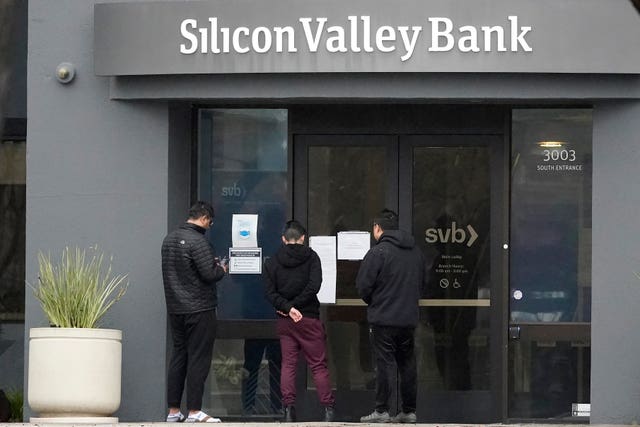British technology companies face a “serious risk” from the collapse of Silicon Valley Bank UK, the Chancellor has warned, as he vowed the Government will do “everything we can” to protect them.
Jeremy Hunt said he has been in talks over the weekend with Prime Minister Rishi Sunak and Bank of England Governor Andrew Bailey, and “we are working at pace on a solution”.
He said the plan will backstop the cashflow needs of firms affected by the implosion of the bank, a lender to “some of our most promising and exciting businesses”.
Mr Sunak, speaking to reporters accompanying him to the US, said the Government recognises the “anxiety and the concerns customers of the bank have” and is “making sure we can work to find a solution that secures people’s operational liquidity and cashflow needs”.
Labour warned that the British start-up industry must not “pay the price” for the bank’s failure and urged the Government to offer more than “warm words” to those affected.
The Bank of England announced on Friday that Silicon Valley Bank UK is set to enter insolvency, following the collapse of its parent company in the United States – the largest failure of a bank since the 2008 financial crisis.
While there is no risk to the UK’s financial system as a whole, Mr Hunt said “there is a serious risk to our technology and life sciences sectors, many of whom bank with this bank”.
Speaking on Sunday morning political broadcast shows, he said: “The Prime Minister and I and the Governor of the Bank of England are absolutely determined to do everything we can to protect the future of these very, very important companies.
“We want to find a way that minimises or, if we possibly can, avoids all losses to those incredibly promising companies.
“What we will do is bring forward very quickly a plan to make sure that they can meet their operational cashflow requirements.”
The Chancellor declined to say whether the Government will guarantee 100% of the deposits companies had with the lender or whether it could mean stepping in with taxpayers’ money.
Shadow chancellor Rachel Reeves stressed the urgency of the situation, noting that when markets open on Monday many companies will not know whether they can pay staff or suppliers.
She said: “We need tomorrow morning to hear from the Government how they are going to protect them. Whether that is guaranteed, whether that is working with the US government on a rescue for Silicon Valley Bank, there are different answers to this problem.
“We cannot let the British start-up community pay the price for this bank failure, because it will be the British economy then that ultimately pays the price.
“I would urge the Government to do more than offer warm words, but come forward with specific plans.”
Mr Sunak reiterated that the Government does not “believe there is a systemic contagion risk”, as he declined to “get into speculating” when pressed on whether an emergency scheme to cover deposits is being considered.
The Prime Minister, who was kept updated by the Chancellor on the situation throughout his flight to San Diego, backed the Bank of England Governor, saying “yes” when asked if Mr Bailey is overseeing a robust regulatory environment for UK banks.

The BVCA, the industry body representing venture capital (VC) funds which hold thousands of investments in UK tech and science companies, said long-term support is needed to protect the country’s innovators, entrepreneurs and funders.
BVCA director general Michael Moore said: “The immediate implications for the tech and wider private capital ecosystem are far reaching. This is about many highly skilled jobs.”
A survey of 31 VC funds found that 34% of their portfolio companies – amounting to 336 – have accounts with Silicon Valley Bank. More than 200 of those now face short or long-term cashflow risk.
The total amount locked into Silicon Valley Bank by these firms is around £2.5 billion, according to the data.
Tech industry representatives were summoned for an emergency roundtable with Secretary to the Treasury Andrew Griffith on Saturday.
Silicon Valley Bank was put under US government control on Friday after being hit by a capital crisis and a bank run.
The Bank of England subsequently ordered its UK subsidiary – the first location it opened outside the US – into insolvency from Sunday evening, putting companies at risk of losing almost all their cash.
It has stopped making payments and accepting deposits. Up to £85,000 of individual clients’ deposits will be protected through the UK’s deposit insurance scheme, meaning many face major losses without Government intervention.
US Treasury secretary Janet Yellen said she was working with regulators to protect US depositors, but ruled out a major bailout.




Comments: Our rules
We want our comments to be a lively and valuable part of our community - a place where readers can debate and engage with the most important local issues. The ability to comment on our stories is a privilege, not a right, however, and that privilege may be withdrawn if it is abused or misused.
Please report any comments that break our rules.
Read the rules here